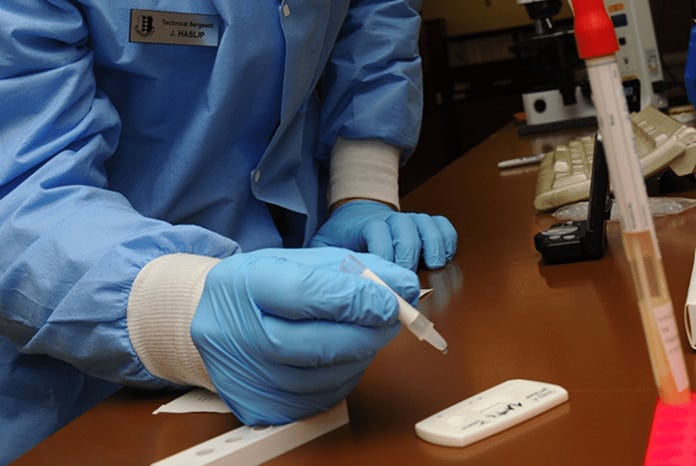The Indian Council of Medical Research (ICMR) and Drugs Controller General of India (DCGI) have jointly come out with guidelines for validation and batch testing of COVID-19 diagnostic kits.
To download the guidelines, click here

The guidelines were approved at a joint meeting of ICMR and DCGI last week. This is recommendatory and dynamic document without prejudice to statutory provisions, said Dr Lokesh Sharma, scientist, ICMR.

As per the guidelines, US FDA approved RT-PCR kits, RNA extraction kits and viral transport medium (VTM), rapid antibody test, ELISA and CLIA kits will not require ICMR validation. The manufacturer and supplier of such kits can directly apply for DCGI approval.
The first batch of CE-IVD approved, non US FDA approved and indigenous RT PCR kits will require validation from any of 24 ICMR identified validation centres prior to DCGI approval, thereafter for post marketing, additional two batches should be tested as per Medical Devices Rules in four months’ time, it stated.
One batch of CE-IVD approved, non US FDA approved, indigenous RNA extraction kits and VTM will require validation from any of ICMR identified validation centres prior to DCGI approval.
The testing of three batches of CE-IVD approved, non US FDA approved, indigenous rapid antibody test, ELISA and CLIA kits will be required for validation from any of ICMR identified validation centres prior to DCGI approval, the guidelines said.
Also read: New Drugs and Clinical Trials draft Rules: Ministry
The firm will be required to provide batch testing certificate while delivering the consignment. ICMR identified validation centre will undertake random samples testing of batches of kits for quality assurance, said Dr Sharma.
The requests for validation of kits for RT-PCR, RNA extraction, VTM, rapid antibody test, ELISA and CLIA will be sent by the manufacturer, supplier through e-mail (gstoteja@gmail.com) to Dr GS Toteja, additional director general, ICMR and national nodal officer for validation.
The request from the manufacturer, supplier should mandatorily be accompanied with information viz. name of manufacturer, supplier, name of the kit and batch no, first time validation by ICMR, details of last validation along with validation report (if it is not first time validation), difference in kit composition as compared to first validation etc.
The request after receipt and scrutiny will be forwarded to any one of the ICMR identified validation centres depending on the work load and other logistics issue if it is first time validation.
If the kit is for second time validation or subsequent validation or in case of any other issue; the manufacturer has to provide justification which will be reviewed at ICMR, New Delhi and decision will be communicated to manufacturer and supplier within a week. The request for re-validation will only be considered if there is any significant change in the composition or type of reagents in the kit.
Once the kit is delivered to the validation centre with adequate number of test reactions required, reagents, methodology etc, validation report will be sent to the manufacturer, supplier within 15 days, added ICMR scientist.
Till date, 97 RT-PCR kits have been evaluated by ICMR validation centres, and 40 RT PCR kits were found to be satisfactory, he informed.
Some of the kits which were found to be include TaqMan 2019-nCoV Control Kit v1 from ABI (Applied bio-system), United States; AStar Fortitude Kit 2.0 from Accelerate Technologies Pte Ltd (DxD Hub), Singapore; LyteStar 2019-nCoV RT PCR Kit 1.0 from ADT India Ltd, New Delhi; RealStar SARS-CoV-2 RT-PCR kit 1.0 from Altona Diagnostics, Germany; ANGPCR 2019-nCoV from Angstrom Biotech Pvt Ltd, Rajasthan; Biogenix Covid-19 one step RT PCR from Biogenix INC Pvt Ltd, Lucknow etc.
There are 24 centres for validation and batch testing of COVID-19 diagnostic kits which include nine ICMR institutes, five department of biotechnology institutes, three CSIR institutes and seven other institutes.
The seven other institutes are Kasturba Hospital for Infectious Diseases, Mumbai, Institute of Liver and Biliary Sciences, New Delhi, Postgraduate Institute of Medical Education & Research (PGIMER), Chandigarh, King George’s Medical University (KGMU), Lucknow, National Institute of Biologicals (NIB), Noida, The King Institute of Preventive Medicine and Research, Chennai, Sawai Man Singh Medical College, Jaipur.
The Health Master is now on Telegram. For latest update on health and Pharmaceuticals, subscribe to The Health Master on Telegram.


